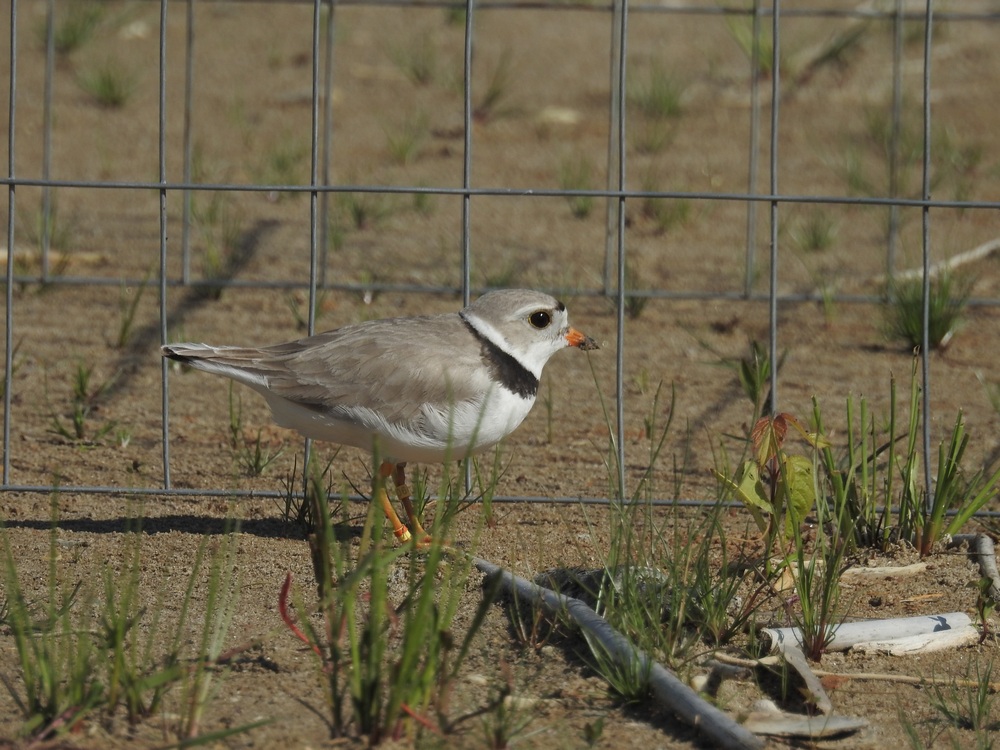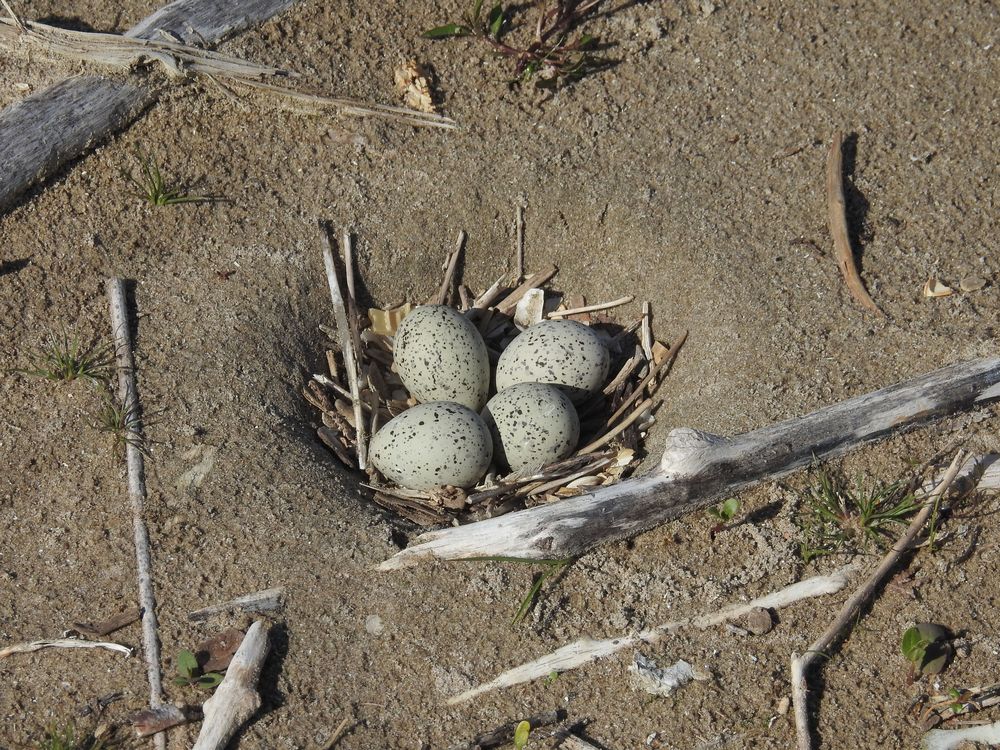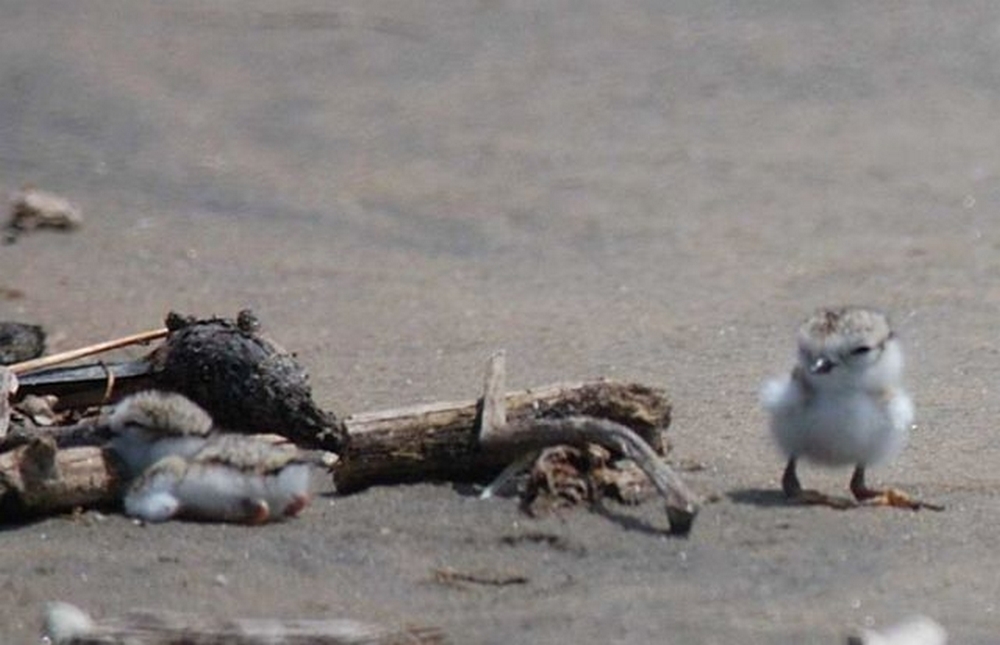Piping Plovers nesting at Presqu’ile after 100 year absence.
Piping Plovers are nesting again at Presqu’ile, for the first time since 1916. These birds are an endangered species. They like to nest on sandy beaches and there within lies the problem. Sandy beaches are the same places that people like to go to play. While it is fun to go to the beach, all that playing disturbs the birds and they stopped nesting in most beaches throughout North America. All three populations, Great Lakes, East Coast and Great Plains were in trouble, but nowhere more so than on the Great Lakes. By the mid-1980s, only 12 nesting pairs were left on the lakes, all in Michigan.
The Americans started a conservation program of nest protection and captive rearing of chicks and numbers started to rise. In 2007 birds nested at Sauble Beach Provincial Park on Georgian Bay, the first birds to nest in Ontario in over 30 years. Georgian Bay continued to get nesting birds, up to 12 nests in a good year. In 2015 the first birds nested on Lake Ontario in 80 years, with a pair in Toronto and in New York State.
This year Piping Plovers started showing up on our beach in early May. That in itself was not that unusual as we have seen 1 or 2 birds every spring for the last decade, but they only stay for a day or two and move on. This year it was different, while the early birds did move on, three more were on the beach by May 18th. Two were males and started displaying to the third bird, a female. This was exciting! Because the birds are banded we were able to tell that all three birds were hatched at Wasaga Beach Provincial Park last year and the two males were brothers! Our own little love triangle.
In the end one brother won out and on May 20th the birds were observed mating. We erected a fence enclosure just to keep people away from their area over the May long weekend. On May 27th the first egg was laid and we placed a small cage over the nest that would keep predators out but allowed the plovers in. We also re-adjusted the rope fence to be a 100m square around the nest.
 Female with protection cage David Bree
Female with protection cage David Bree
On Friday June 3rd a full clutch of 4 eggs had been laid and a large predator deterrent cage was placed over the nest, replacing the small cage used when the eggs are being laid over a period of a week. This was carried out by a team of 6 people from CWS, MNRF and Ontario Parks.
 Nest and eggs David Bree
Nest and eggs David Bree
This maneuver, requiring the pounding in of corner posts and essentially building the cage on site, took 20 minutes, which is the standard time allowed. The female did show some anxiety, trying a few broken wing displays and circling the nest piping away. This protection technique has been used in the US and elsewhere in Canada since 1984 and results in an increase of hatching success of almost 100% going from 37% to 72% hatching success.
She accepted the new structure easily and was back on the nest within seconds of us stepping away from the cage. The male, who seemed much less distressed, took his turn on the nest after about ½ hour so both birds indicated they accepted the new situation.
The eggs are projected to hatch around June 28th. We are looking to provide a couple of chick shelters on the beach to protect the chicks in case of inclement weather like hail which killed chicks in Wasaga a few years ago.
 Chicks at Wasaga Beach June 28, 2008 MNR
Chicks at Wasaga Beach June 28, 2008 MNR
We will also be looking to form a “guardian” group to watch over the babies and inform visitors that walk past what is going on. I am anticipating shifts of at least 3 hours in length, possibly longer. Priority will be to have people out there on the weekends, particularly the July and August long weekends. I anticipate the birds will be gone by mid – late August. We will work to get some shaded structure out there for people.
I would like to start gathering names of those that would be willing to commit to be guardians. Please pass that news around and have people send me their names with dates and times available to (link no longer valid.)
David


